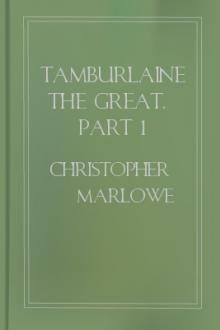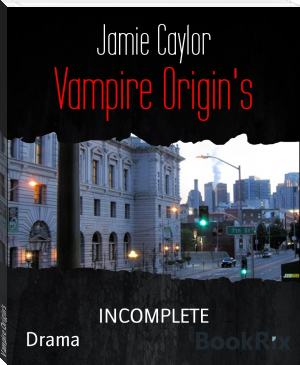Tamburlaine the Great, Part 1 - Christopher Marlowe (online e reader txt) 📗

- Author: Christopher Marlowe
- Performer: -
Book online «Tamburlaine the Great, Part 1 - Christopher Marlowe (online e reader txt) 📗». Author Christopher Marlowe
<19> ships] So the 4to.—The 8vo “shippe.”
<20> Pass] So the 8vo.—The 4to “Hast.”
<21> you] So the 8vo.—The 4to “they.”
<22> Ceneus] Here both the old eds. “Conerus.”
<23> states] i.e. noblemen, persons of rank.
<24> their] So the 8vo.—The 4to “the.”
<25> and Persia] So the 8vo.—The 4to “and OF Persia.”
<26> ever-raging] So the 8vo.—The 4to “RIUER raging.”
<27> ALL] So the 4to.—Omitted in the 8vo.
<28> And Jove may, &c.] i.e. And may Jove, &c. This collocation of words is sometimes found in later writers: so in the Prologue to Fletcher’s WOMAN’S PRIZE,—“WHICH this may PROVE!”
<29> knew] So the 8vo.—The 4to “knowe.”
<30> lords] So the 4to.—The 8vo “Lord.”
<31> injury] This verb frequently occurs in our early writers. “Then haue you INIURIED manie.” Lyly’s ALEXANDER AND CAMPASPE, sig. D 4, ed. 1591. It would seem to have fallen into disuse soon after the commencement of the 17th century: in Heywood’s WOMAN KILLED WITH KINDNESS, 1607, we find,
“You INJURY that good man, and wrong me too.” Sig. F 2.
but in ed. 1617 “injury” is altered to “iniure.”
<32> ALL] So the 4to.—0mitted in the 8vo.
<33> Who, travelling, &c.] The halting metre shews that there is some corruption in this and the next line.
<34> thorough] So the 8vo.—The 4to “through.”
<35> unvalued] i.e. not to be valued, or estimated.
<36> conceit] i.e. fancy, imagination.
<37> Rhodope] Old eds. “Rhodolfe.”
<38> valurous] i.e. valuable.
<39> pools] So the 8vo.—The 4to “Poles.”
<40> resolv’d] i.e. dissolved.—So the 8vo.—The 4to “desolu’d.”
<41> Shall we all offer] The 8vo “Shall we offer” (the word “all” having dropt out).—The 4to “WE ALL SHALL offer.<”>
<42> in] The 8vo “it.”—Omitted in the 4to.
<43> triumph’d] So the 8vo.—The 4to “tryumph.”
<44> brave] i.e. splendidly clad.
<45> top] So the 4to.—The 8vo “foot.”
<46> mails] i.e. bags, budgets.
<47> lance] So the 4to.—Here the 8vo has “lanch;” but more than once in the SEC. PART of the play it has “lance.”
<48> this] So the 8vo.—The 4to “the.”—Qy. “Where is this Scythian SHEPHERD Tamburlaine”? Compare the next words of Theridamas.
<49> vaults] Here the 8vo has “vauts,”—“which,” says one of the modern editors, “was common in Marlowe’s time:” and so it was; but in the SEC. PART of this play, act ii. sc. 4, the same 8vo gives,—
“As we descend into the infernal VAULTS.”
<50> thy] So the 8vo.—The 4to “the.”
<51> brave] See note � in preceding column.<i.e. note 44.>
<52> renowmed] i.e. renowned.—So the 8vo.—The 4to “renowned.” —The form “RENOWMED” (Fr. renomme) occurs repeatedly afterwards in this play, according to the 8vo. It is occasionally found in writers posterior to Marlowe’s time. e.g.
“Of Constantines great towne RENOUM’D in vaine.” Verses to King James, prefixed to Lord Stirling’s MONARCHICKE TRAGEDIES, ed. 1607.
<53> cliffs] So the 8vo.—The 4to “cliftes.”
<54> merchants] i.e. merchant-men, ships of trade.
<55> stems] i.e. prows.
<56> vail] i.e. lower their flags.
<57> Bootes] The 8vo “Botees.”—The 4to “Boetes.”
<58> competitor] i.e. associate, partner (a sense in which the word is used by Shakespeare).
<59> To these] Old eds. “ARE these.”
<60> renowmed] See note ||, p. 11.<i.e. note 52.>—So the 8vo. —The 4to “renowned.”
<61> statues] So the 4to.—“The first edition reads ‘statutes,’ but, as the Scythians worshipped Pylades and Orestes in temples, we have adopted the reading of the quarto as being most probably the correct one.” Ed. 1826.
<62> kings] So the 8vo.—The 4to “king.”
<63> Nor thee nor them] The modern editors silently print “Nor THEY nor THEIRS.”
<64> will] So the 8vo.—Omitted in the 4to.
<65> pitch] Is generally equivalent to—stature. (“I would have you tell me what PITCH he was of, Velim mihi dicas qua STATURA fuerit.” Coles’s DICT.) But here it means the highest part of the body,—the shoulders (see the 10th sign. of PITCH in Halliwell’s DICT. OF ARCH. AND PROV. WORDS),—the “pearl” being, of course, his head.
<66> and] So the 4to.—The 8vo “with.”
<67> His arms and fingers long and sinewy] So the 8vo, except that, by a misprint, it has “snowy” for “sinewy.”—The 4to gives the line thus,—
“His armes long, HIS fingers SNOWY-WHITE.”!!
(and so the line used to stand in Lamb’s SPEC. OF DRAM. POETS, till I made the necessary alteration in Mr. Moxon’s recent ed. of that selection.)
<68> subdu’d] So the 8vo.—The 4to “subdue.”
<69> Nature doth strive with Fortune, &c.] Qy did Shakespeare recollect this passage when he wrote,—
“Nature and Fortune join’d to make thee great”? KING JOHN, act iii. sc. 1.
<70> port] i.e. gate.
<71> is] So the 8vo.—The 4to “in.”
<72> In fair, &c.] Here “fair” is to be considered as a dissyllable: compare, in the Fourth Act of our author’s JEW OF MALTA,
“I’ll feast you, lodge you, give you FAIR words, And, after that,” &c.
<73> of] i.e. on.
<74> worse] So the 8vo.—The 4to “worst.”
<75> the] So the 8vo.—The 4to “that.”
<76> his] So the 8vo.—The 4to “the.”
<77> be] So the 8vo.—The 4to “are.”
<78> Beside] So the 8vo.—The 4to “Besides.”
<79> champion] i.e. champaign.
<80> greedy after] Old eds. “after greedie.”
<81> Sprung] Here, and in the next speech, both the old eds. “Sprong”: but in p. 18, l. 3, first col., the 4to has “sprung”, and in the SEC. PART of the play, act iv. sc. 4, they both give “SPRUNG from a tyrants loynes.”
<Page 18, First Column, Line 3, This Play: “For he was never sprung<118> of human race,”>
<82> teeth of] So the 8vo.—Omitted in the 4to.
<83> lance] Here both the old eds. “lanch”: but see note ||, p. 11.<i.e. note 47.>
<84> the] So the 8vo.—0mitted in the 4to.
<85> some] So the 4to.—The 8vo “scorne.”
<86> will] So the 8vo.—The 4to “shall.”
<87> top] i.e. rise above, surpass.—Old eds. “stop.”
<88> renowmed] See note ||, p. 11.<i.e. note 52.> So the 8vo. —The 4to “renowned.”
<89> thirst] The 8vo “thrust”: the 4to “thrist.”
<90> and] So the 4to.—The 8vo “not.”
<91> the fair] So the 8vo.—The 4to “THEE faire.”
<92> she] i.e. Nemesis.
<93> Rhamnus’] Old eds. “Rhamnis.”
<94> meeds] So the 8vo.—The 4to “deeds.”
<95> into] Used here (as the word was formerly often used) for UNTO.
<96> sure] A dissyllable here. In the next line “assure” is a trisyllable.
<97> with his crown in his hand] The old eds. add “offering to hide it;” but THAT he does presently after.
<98> those were] i.e. those who were, who have been.
<99> Stand staggering] So the 8vo.—The 4to “Stand THOSE staggering.”
<100> For kings are clouts that every man shoots at, Our crown the pin, &c.] CLOUT means the white mark in the butts; PIN, the peg in the centre, which fastened it.
<101> me] So the 4to.—Omitted in the 8vo.
<102> MYCETES. Ay, marry, &c.] From this to “TAMBURLAINE. Well, I mean you shall have it again” inclusive, the dialogue is prose: compare act iv. sc. 4, p. 29.
<103> renowmed man-at-arms] See note ||, p. 11.<i.e. note 52.> So the 8vo.—The 4to “RENOWNED MEN at armes.”
<104> chiefest] So the 4to.—The 8vo “chiefe.”
<105> happy] So the 8vo.—The 4to “happiest.”
<106> aim’d] So the 4to.—The 8vo “and.”
<107> it] So the 4to.—The 8vo “is.”
<108> our] So the 4to.—Omitted in the 8vo.
<109> we] So the 8vo.—The 4to “I.”
<110> in earth] i.e. on earth. So in the Lord’s Prayer, “Thy will be done IN EARTH.”
<111> Casane] Both the old eds. here “Casanes.”
<112> a-piece] So the 4to.—The 8vo “apace.”
<113> purchase] i.e. booty, gain.
<114> quite] i.e. requite.
<115> this] So (<<deiktikos>>) the 8vo.—The 4to “the.”
<116> him] Old eds. “his.”
<117> and] So the 8vo.—The 4to “with.”
<118> sprung] See note �, p. 14.<i.e. note 81.>
<119> dares] So the 8vo.—The 4to “dare.”
<120> fate] Old eds. “state.”
<121> Resolve] Seems to mean—dissolve (compare “our bodies turn to elements,” p. 12, sec. col.): but I suspect some corruption here.
<Page 12, Second Column, This Play: “TAMBURLAINE… . . Until our bodies turn to elements, And both our souls aspire celestial thrones.—” etc.>
<122> Barbarous] Qy. “O barbarous”? in the next line but one, “O treacherous”? and in the last line of the speech, “O bloody”? But we occasionally find in our early dramatists lines which are defective in the first syllable; and in some of these instances at least it would almost seem that nothing has been omitted by the transcriber or printer.
<123> artier] i.e. artery. This form occurs again in the SEC. PART of the present play: so too in a copy of verses by Day;
“Hid in the vaines and ARTIERS of the earthe.” SHAKESPEARE SOC. PAPERS, vol. i. 19.
The word indeed was variously written of old:
“The ARTER strynge is the conduyt of the lyfe spiryte.” Hormanni VULGARIA, sig. G iii. ed. 1530.
“Riche treasures serue for th’ARTERS of the war.” Lord Stirling’s DARIUS, act ii. Sig. C 2. ed. 1604.
“Onelye the extrauagant ARTIRE of my arme is brused.” EVERIE WOMAN IN HER HUMOR, 1609, sig. D 4.
“And from the veines some bloud each ARTIRE draines.” Davies’s MICROCOSMOS, 1611, p. 56.
<124> regiment] i.e. rule.
<125> fruit] So the 4to.—The 8vo “fruites.”
<126> are] Old eds. “Is.”
<127> talents] Was often used by our early writers for TALONS, as many passages might be adduced to shew. Hence the quibble in Shakespeare’s LOVE’S LABOUR’S LOST, act iv. sc. 2., “If a TALENT be a claw,” &c.
<128> harpy] So the 8vo.—The 4to “Harper;” and with that reading the line is cited, in a note on MACBETH, act iv. sc. 1, by Steevens, who also gives “tires UPON my life;” but “TIRES” (a well-known term in falconry, and equivalent here to—preys) is to be pronounced as a dissyllable. (In the 4to it in spelt “tyers.”
<129> the] So the 4to.—The 8vo “thy.”
<130> bassoes] i.e. bashaws.
<131> Christians renied] i.e. Christians who have denied, or renounced their faith.—In THE GENT. MAGAZINE for Jan. 1841, J. M. would read “Christians RENEGADENS” or “CHRISTIAN RENEGADES:” but the old text is right; among many passages that might be cited, compare the following;
“And that Ydole is the God of false Cristene, that han RENEYED hire FEYTHE.” THE VOIAGE AND TRAVAILE OF SIR JOHN MAUNDEVILE, p. 209. ed. 1725.
“For that thou should’st RENY THY FAITH, and her thereby possesse. The Soldan did capitulat in vaine: the more thy blesse.” Warner’s ALBIONS ENGLAND, B. XI. Ch. 68. p. 287. ed.
1596.
<132> Terrene] i.e. Mediterranean.
<133> Renowmed] See note ||, p. 11.<i.e. note 52.> So the 8vo. —The 4to “renowned.”
<134> basso] So the 8vo.—The 4to “Brother.”
<135> Not] So the 8vo.—The 4to “Nor.”
<136> in] So the 8vo.—The 4to “on.”
<137> Or spread, &c.] A word has dropt out from this line.
<138> measur’d heaven] So the 8vo.—The 4to “measured THE heauen.”
<139> pioners] The usual spelling of the word in our early writers (in Shakespeare, for instance).
<140> ceaseless] So the 8vo.—The 4to “carelesse.”
<141> conceits] i.e<.> fancies, imaginations.
<142> counterfeit] i.e. picture, resemblance.
<143> his] So the 8vo.—The 4to “the.”
<144> you] So the 8vo.—The 4to “me.”
<145> Leave] The author probably wrote, “AGYDAS, leave,” &c.
<146> facts] i.e. deeds.
<147> much] So the 8vo.—The 4to “more.”
<148> Pierides] i.e. The daughters of Pierus, who, having challenged the Muses to a trial of song, were overcome, and changed into magpies.
<149> the young Arabian] Scil. Alcidamus; see p. 10, l. 9, sec. col.
<Page 10, Second Column, Line 9, This Play: “Where her betrothed lord, Alcidamus,”>
<150> Fearing his love] i.e. Fearing with respect to his love.
<151> of] so the 4to.—The 8vo “and.”
<152> fury] So the 4to.—The 8vo “furies.”
<153> shone] Old eds. “shine.”
<154> send]





Comments (0)